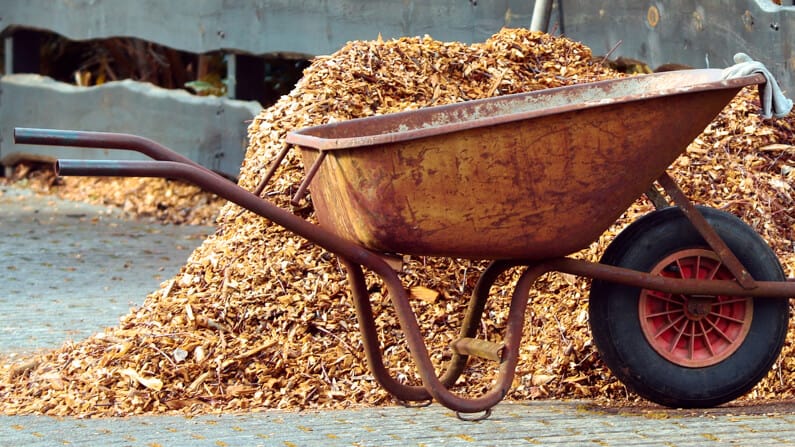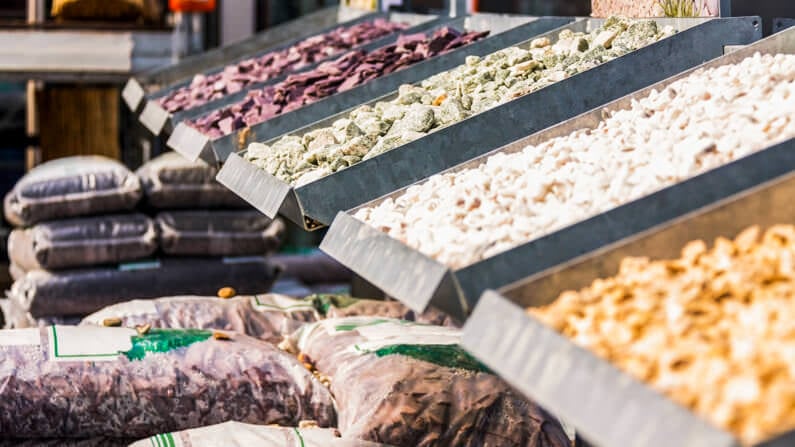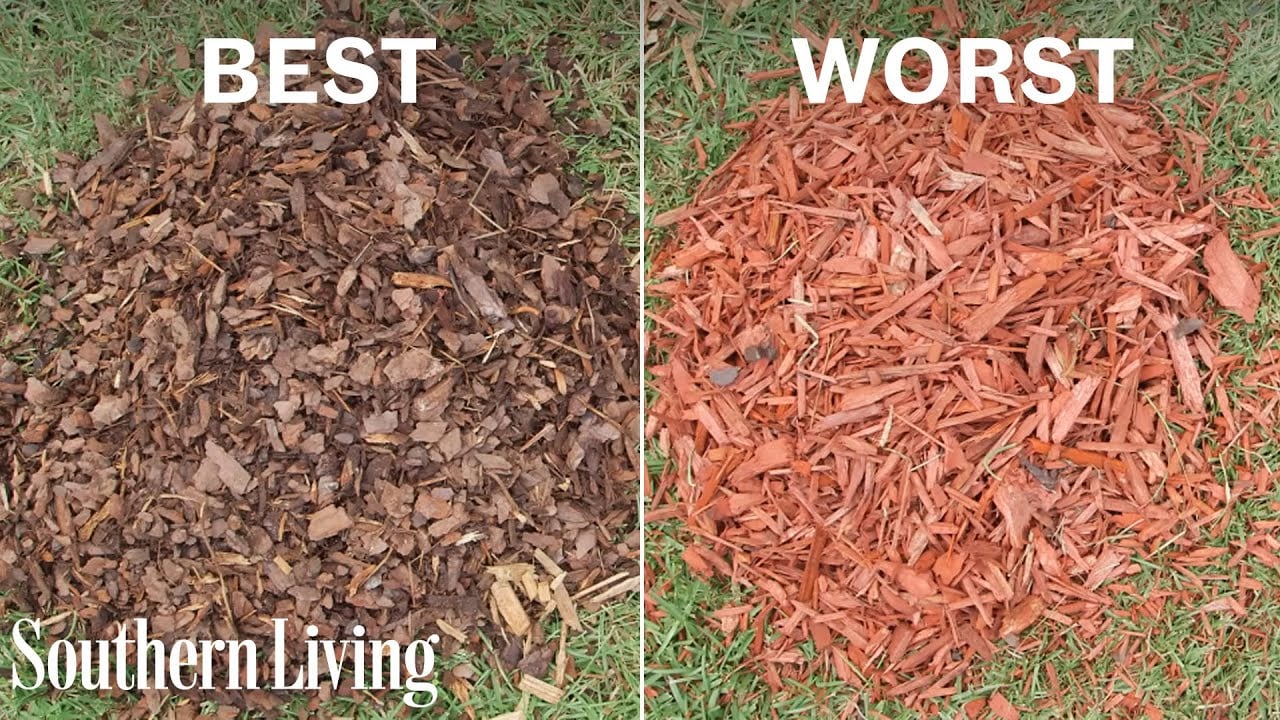Mulch: How to Choose The Best One
With color choices like red, brown, and black, and materials like wood, stone, and rubber, how can you choose the right mulch for your garden without getting overwhelmed?
All you have to do is follow three simple steps.
These three steps will help you avoid the kind of devastating mistake that one new gardener made last spring.
Let me walk you through what happened to Jan.
Heads up: I’ll earn a small commission if you buy something after clicking a link in this post. I only link to products I’d recommend to my best friend.

Jan decided she should mulch her flower beds because her next-door neighbor said that mulching cut his water bill by a third.
Sounds great, right?
Mulch has a lot of great qualities, and water retention can be one of them. But Jan was about to learn a hard lesson about choosing the right mulch.
Jan and her husband Kyle headed to their local landscape supply store to order some mulch.
And when she saw the giant display with samples of over 30 types of wood, bark, and rock mulches, her eyes got wide, and she thought to herself, “I had no idea there’d be so many choices. I don’t know what to pick. I’ll see what the salesperson recommends.”
Kyle, trying to be helpful, suggested “Let’s get the mulch our next-door neighbor has. It’s this gorilla hair mulch, and his garden looks great!”
When they got to the counter, Jan asked the clerk what mulch would be best. Kyle piped in and mentioned the gorilla hair mulch. After eyeing the long line of irritated customers stretching out the door, the harried clerk quickly agreed with Kyle’s choice. And he didn’t bother to mention that there’s a downside to this mulch.
Sadly, taking advice from the sales clerk and her husband was Jan’s biggest mistake.
Why?
Because Jan needed to be the one to pick the best type of mulch for her garden, not the impatient clerk struggling to get through a busy spring weekend, or Kyle, who had little to no knowledge about mulch.
She could’ve picked the right mulch if she knew what questions to ask before choosing a mulch.
You’ll discover what those questions are when you learn my three-step method. And you’ll avoid the awful experience that followed Jan’s trip to the landscape supply store.
Soon after Jan and Kyle got back from the store, the delivery truck dropped off the mulch.
And Jan’s mouth fell open.
It was like someone had set down a small mountain in their driveway, which meant they’d be doing a ton of work to move all that mulch. And they had to move it all that day so they could get their cars out of the garage and go to work tomorrow! So, Jan and Kyle spent eight long hours chipping away at that mulch mountain one wheelbarrow full at a time.
Shoveling and spreading the mulch was a lot of work, but Jan knew it would be worth the effort. She was looking forward to saving money on her water bill!
When they were done, the yard looked beautiful. The mulch gave the flower beds that manicured, finished look she wanted.
And everything was great – for a while.
Then over the summer, the rain stopped, and the temperature spiked into the 90s for over a month.
She was horrified to discover the gorilla hair mulch was an enormous mistake!
Why?
Gorilla hair mulch is a finely shredded mulch made from redwood or cedar. Several weeks after you spread this mulch, it mats and can make it hard for water to get through.
And when there’s no rain to thoroughly soak the mulch, the problem can get even worse. Because of this matting effect, it repels water when you irrigate overhead with a sprinkler.
Jan doesn’t have drip irrigation, but her next-door neighbor does, which is why the mulch works for him. But Jan didn’t know this was something she needed to consider.
Jan’s beloved flowers were slowly dying due to a lack of water.
No matter how long she ran the sprinkler, she couldn’t get the soil under the mulch wet enough. The mulch would soak up all the water, and then dry out because of the heat, so very little of the water was making its way to her plants.
But what happened next might surprise you.
After Jan and Kyle lost a few plants and saw a huge increase in their water bill, they recognized their mistake. And they decided to cut their losses by getting rid of the gorilla hair mulch before any more plants died.
They spent eight backbreaking, miserable hours scraping the mulch off, shoveling it into the back of their pickup, and hauling it away. Jan was able to save her remaining flowers because she could now give them enough water.
And after that experience, who could blame Jan if she decided to never let another bit of mulch into her garden again?
But she wasn’t ready to give up on mulch. She was determined to get it right.
And after following my three steps, she picked the perfect mulch for her garden.
Now her flowers are thriving.
And here’s how you can get the same results…
- Download my mulching cheat sheet to find the best mulch for your garden.
- And follow my three steps for picking the perfect mulch for your garden.
- Then get ready to grow your best garden ever, just like Jan!
1. Focus on the kind of plants you want to mulch
Are you planning on mulching your vegetable garden?
Or, are you mulching ornamental plants like flowers, trees, or shrubs?
Make a note of what plants you’re going to mulch before moving on to step two. This will help you narrow down your choices right from the start.
2. Decide on the results you want from your mulch
Mulch can do a lot of things for your garden, but every mulch can’t do everything.
Do you need your mulch to:
- Suppress weeds? Look for an organic mulch.
- Look good? Both organic and inorganic mulches can look good.
- Stay put in fierce winds? Some organic and all inorganic mulches will stay put in high winds.
- Slow down evaporation? Both organic and inorganic mulches help retain moisture.
- Be fireproof? Choose a rock mulch.
- Reduce soil-borne plant diseases? Both organic and inorganic mulches help with this.
- Not float away in a heavy rain? Rock or stone mulches are the best choices.
- Allow water from sprinklers or rain to easily get through? Most organic and inorganic mulches will do this. I let you know if a mulch repels overhead irrigation.
- Protect your soil from temperature swings? Choose an organic mulch.
- Keep your soil cooler when it’s hot? Choose an organic mulch.
- Add warmth to your vegetable garden soil? Choose a plastic mulch.
- Add organic matter to your soil? Choose an organic mulch.
- Not need to be topped off each year? Choose a rock mulch. Warning: you’ll still have to weed it!
- Reverse or prevent soil compaction? Choose an organic mulch that breaks down quickly.
- Create pathways? Both organic and inorganic mulches can be used for pathways.
- Be cheap or free? Choose an organic mulch.
Choose the top three things your mulch should do, and write those down. Take the guesswork out of choosing the best type of mulch. Get your FREE Mulching Cheat Sheet now!
3. Find the perfect types of mulch for your garden
All mulches aren’t created equal.
They all have their strengths and weaknesses.
And I cover the advantages and disadvantages of different organic mulches and inorganic mulches so you can make an informed decision.
I’ve included a review of each kind of mulch. I let you know what my top picks are, and why.
You’ll know whether each mulch is
- Recommended
- Recommended with reservations
- Not recommended
Since there’s a lot to learn about mulch, and a lot of different kinds of mulch to choose from (I’ve reviewed 26 different kinds of mulch), I created a free cheat sheet for you that has all the details about each type of mulch in one handy download. Click here to download the mulching cheat sheet.
Before you dive into the advantages and disadvantages of specific types of mulch it’s important to know a bit about the two main types of mulch: organic and inorganic.
The two main types of mulch: organic and inorganic
Organic Mulches

One of their main benefits is feeding your soil. As they decompose they add nutrients to your soil that feed the micro-organisms who feed your plants.
Advantages of organic mulches:
- They can contribute a steady stream of organic matter to your soil.
- How much organic matter they add depends on how quickly they break down. Some break down faster than others.
- Organic mulches are the best type of mulch for weed control. But some are better at it than others.
- They help moderate soil temperatures by keeping your soil from getting too hot in the summer, and they help protect plants from heaving when the ground freezes.
Disadvantages of organic mulches:
- Since many organic mulches don’t weigh much, they can blow around in strong winds or float away in heavy rains.
- Because they break down, they need to be topped off annually.
- Some organic mulches, like straw, can attract mice or voles.
Want to use an organic mulch?
Read my reviews of 21 different types of organic mulch, and download my mulch cheat sheet so you can have all this information in one easy-to-use resource.
Related: Choose the best living mulch for your garden.
Watch a video from Southern Living Magazine about the best type of mulch:
Inorganic Mulches

Inorganic mulches don’t decompose like organic mulches do. They’re either mined (stone, rock, or gravel) or made from man-made materials. Stone and rock last a very long time. But plastic mulches typically only last one season.
Advantages of inorganic mulches:
- Inorganic mulches don’t break down, so they typically don’t need to be topped off like organic mulches do.
- Stone, rock, or gravel mulch is fireproof and is the best choice if you live in a fire-prone area and need to mulch next to your house or other structures.
- Gravel, stone, and rock mulches won’t blow or float away as easily as organic mulches will.
Disadvantages of inorganic mulches:
- Rocks retain heat, and excessive use of rock mulch in the Southwestern U.S. has contributed to excessive heat in urban areas.
- Some inorganic mulches are pretty terrible at suppressing weeds. (I’m lookin’ at you – rock, stone, and gravel!)
- They don’t improve your soil because they can’t add organic matter to your soil.
Considering using an inorganic mulch?
Read my reviews of seven different types of inorganic mulch, and get my mulch cheat sheet so you can have all the details in one easy-to-use resource.
You can avoid the mulching mistakes Jan made
Remember Jan’s big mulching mistake? She didn’t know what questions to ask when choosing a mulch for her garden.
But after following my three simple steps, she picked the right mulch for her garden.
Now she’s growing her best garden ever.
You can get the same results when you download my mulching cheat sheet.
Download the mulching cheat sheet. And choose the best mulch for your garden in three easy steps.
- Note what plants you want to mulch.
- Decide on the top three things your mulch needs to do.
- Look through the chart of mulches in the cheat sheet to find the perfect mulch. The chart includes details about 26 different mulches. They’re grouped by mulches that I:
- recommend
- recommend with reservations, and
- don’t recommend
Here’s a sneak peek of your printable cheat sheet:

Now It’s Your Turn: What turned out to be the best types of mulch to use in your garden? Share in a comment below!



Thank you for explaining that organic mulches and contribute a steady stream of organic matter to your soil. My sister has been thinking about how she will make the trip she just planted in her yard last. I will be sure to send this article to her so seh can know the different types of mulch she can buy.
Hi Sandra,
Thanks for sharing the article! I think your sister will find it helpful.